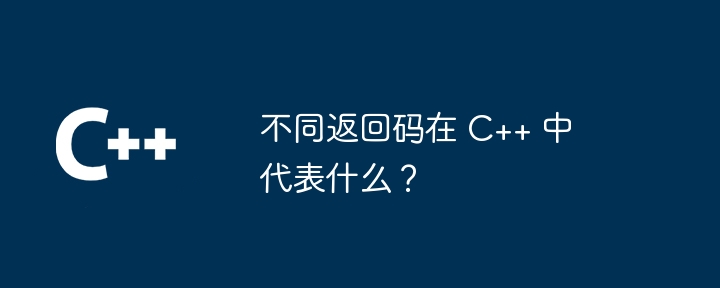Home >Backend Development >C++ >What do different return codes mean in C++?
What do different return codes mean in C++?
- 王林Original
- 2024-04-30 15:24:011392browse
In C, functions represent operation results through return codes: common return codes: 0 (success), 1 (error), -1 (file operation error), NULL (null value), errno (system error code) Custom return codes: Defined through enumerations or custom types to meet specific needs. Practical case: The open_and_read_file() function uses enumeration types to represent the results of file operations, and uses switch statements to take corresponding actions based on the return code.

The meaning of different return codes in C
In C programs, functions and methods usually represent operations through return codes result or status. These return codes can be integers, enumerations, booleans, or other custom types. Understanding the meaning of different return codes is critical to debugging and maintaining your code.
Common return codes
The following are some common return codes in C:
- 0: means The operation executes successfully and accomplishes the intended goal.
- 1: Indicates that the operation was not performed successfully or an error was encountered.
- -1: Typically indicates a file operation error (for example, failure to open or close the file).
- NULL: Represents a null value or null pointer.
- errno: Represents an error code set by a system function (for example, the strerror() function).
Custom Return Codes
In addition to these common return codes, you can also customize return codes to meet your specific application needs. This can be achieved by defining an enumeration or creating your own custom type.
For example, in the following enumeration, we define the different return codes that the operation may produce:
enum class CustomResultCode {
Success,
InvalidArgument,
ResourceNotFound,
PermissionDenied,
InternalError
};Practical case
Let's look at one Practical examples of using custom return codes. Let's say we have a function that tries to open a file and read from it. The following code demonstrates how to use enumeration types to represent the results of operations:
#include <iostream>
#include <fstream>
using namespace std;
enum class FileOperationResultCode {
Success,
FileOpenError,
FileReadError,
OtherError
};
FileOperationResultCode open_and_read_file(const string& filename) {
ifstream file(filename);
if (!file.is_open()) {
return FileOperationResultCode::FileOpenError;
}
string line;
while (getline(file, line)) {
cout << line << endl;
}
if (file.bad()) {
return FileOperationResultCode::FileReadError;
}
return FileOperationResultCode::Success;
}
int main() {
string filename;
cout << "Enter the filename: ";
getline(cin, filename);
FileOperationResultCode result = open_and_read_file(filename);
switch (result) {
case FileOperationResultCode::Success:
cout << "File successfully opened and read." << endl;
break;
case FileOperationResultCode::FileOpenError:
cout << "Error opening the file." << endl;
break;
case FileOperationResultCode::FileReadError:
cout << "Error reading from the file." << endl;
break;
case FileOperationResultCode::OtherError:
cout << "An unknown error occurred." << endl;
break;
}
return 0;
}In this example, the open_and_read_file() function returns a FileOperationResultCode enumeration value. We can use the switch statement to perform different actions based on the return code.
The above is the detailed content of What do different return codes mean in C++?. For more information, please follow other related articles on the PHP Chinese website!

